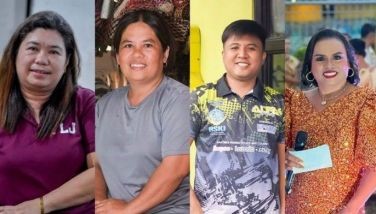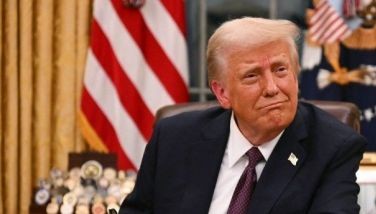My All Soul All-Star team
This weekend, we remember our dear departed and reflect on what they brought to our lives, and rekindle the memories they left us with. We can look back on the people who influenced our lives and led us to where we are, knowingly or unknowingly, for better or for worse. For some it is a chance to get out of town and take a deep breath before plunging back into the chaotic sea of work.
Taking from the “famous people in history†question, this writer thought of famous people in history who contributed mightily to sports as we know it. As an avid reader of history, I thought of people I would want to spend a day or dinner with, and ask all these questions I have in my mind about their lives. Books can only take you so far, after all.
James Naismith. Having been blessed by basketball most of my life, the first person I would want to meet would be James Naismith. I have a list of questions for him as long as my arm. Most of them circle around how his creation has taken off around the world. What was it like in basketball’s nascent years? How did he project the game evolving? What was his impression of the first Filipinos who played in the Olympics in 1936? What would he think of Magic Johnson, Michael Jordan, Shaquille O’Neal, LeBron James and all the international athletes of today? Would he have been surprised by China’s emergence in the sport?
Howard Cosell. You can’t be a sports journalist or broadcaster and not want to meet Howard Cosell. I’d ask him what it was like being a Jewish lawyer who was looked down upon for becoming a sports broadcaster so late in life. He helped propel so many sports onto prime time on the strength of his personality. He had Muhammad Ali on “ABC’s Wide World of Sports†dozens of times, even though he was vilified by racists all across America. Their friendship helped Ali survive his persecution when he refused to be drafted for the Vietnam War. Though he seemed to be the grumpy old man of sports, he did his best to stand for what was right.
Roone Arledge. Here in the Philippines, not too many people know that Roone Arledge was a pioneer in sports production. He built ABC Sports and later ABC News into powerhouses in the 1970’s to 1980’s. He put the spotlight on boxing, American football, the NBA, the Olympic Games and winter sports. Setting the standard for all future generations of sports broadcasts. A wily negotiator, he was always thinking ahead, and to this day, we benefit from many of his ideas on how sports should be covered.
Joe Cantada. My dear friend taken too soon a little over two decades ago. He was always witty, charming, entertaining and innovative, despite having a classical education. As a relative newcomer to the industry, he was perhaps the first fellow commentator I looked up to. When he passed away from cancer, I felt as if one of the guideposts of my life had been taken away, and I wished I had spent more time with him over a whiskey or brandy or two. Sometimes I still ask myself, what would Joe have done?
Flash Elorde. One of the greatest Filipino boxers of all time, and an outstanding human being. Da Flash passed away in 1987, a year after I started working. A most generous soul who never refused pleas for help, Elorde was one of the trailblazers for professional boxing in the Philippines. I would ask him what it was like trying to survive in the early days of the sport, and what it took for him to stay undefeated as junior lightweight champ for seven years. Lastly, I’d get his impressions on where boxing has gone, the emergence of mixed martial arts, and Manny Pacquiao and Nonito Donaire Jr.
Duk Kuo Kim. The tragic hero of professional boxing, whose death from a world title fight with Ray “Boom Boom†Mancini propelled changes in the rules of the sport, foremost of which were higher safety standards and shortening of bouts from 15 rounds to 12. If he were alive today, what would he say to Mancini and his mother, whose lives were all clouded forever by that day. Did he regret getting into the ring despite people saying it was a mismatch?
Jesse Owens. His was perhaps the ultimate up and down ride in all of sports. After his glorious days in the Berlin Olympics, he became dirt poor in a racist America, often reduced to running against a variety of animals and playing exhibitions with the Harlem Globetrotters to earn a living. What was it like in Berlin? How did he feel when Hitler snubbed him? What does he feel his role is in world sports history?
Ambrosio Padilla. The captain of The Islanders, our first Olympic basketball team. How did the team manage to come together despite their social differences? What was it like spending a long, lonely, month-long voyage by sea and rail to Berlin? Does he feel betrayed that, despite losing only one game, the country was deprived of a medal because of a rule change midway through the tournament? What would he think of basketball today, and our challenge of making it back into the Olympics?
Wilt Chamberlain. The most intriguing and personal interview on this list. I’d ask the Big Dipper where his larger than life personality came from. Next, his on and off again friendship with Kareem Abdul-Jabbar and how rough it was being a giant in the NBA in the 1960’s. Of course, also on my list would be the 100-point game, and his claim of having bedded 20,000 women in his career.
* * * *
The Confederation of Filipino Consulting Organizations (COFILCO) will be holding its general assembly meeting and constitutional convention at the Architectural Centre Club, Inc. at the Rockwell compound in Makati City on Nov. 12, starting at 1 pm. Non-members are also invited, and may seek membership at the event proper. For inquiries, contact Verna Manlangit through 0917- 9511670 or 310-4931 to 33.
- Latest
- Trending
































